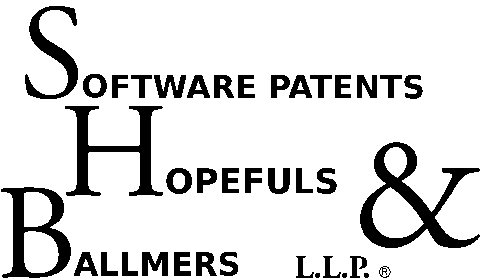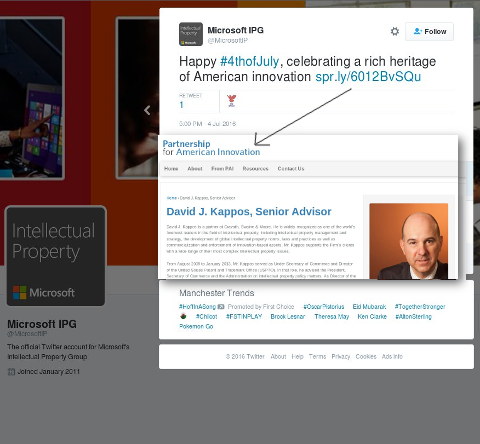07.11.16
Posted in Courtroom, Deception, Microsoft, Patents at 3:44 pm by Dr. Roy Schestowitz
“Reality distortion field (RDF) is a term coined by Bud Tribble at Apple Computer in 1981…” –Wikipedia

Shook, Hardy and Bacon L.L.P. with a slant
Summary: Another new example of software patents advocacy from IAM, with help from Microsoft’s people (or ‘former’ people)
NOT only patent trolls, the PR firm of the EPO and various patent law firms send money IAM’s way. Joff Wild has quite a few hands feeding him and these tend to be ardent advocates of patent wars (they profit from wars). It’s not really a news site, even if Google News recognises it as such. It is agenda. Sometimes it’s marketing.
Earlier today IAM gave readers the impression of software patents resurgence. As we have been showing here for a number of months, this could not be further from the truth and this claim comes (or sourced) from Microsoft’s former Patent Counsel, Bart Eppenauer. Joff Wild previously gave Bart Eppenauer a voice/platform in his Microsoft-powered site for similar reasons. It is not too shocking to find the site once again being composed, by proxy, by Microsoft folks in order to promote software patents, like those which Microsoft uses to continue its war on GNU/Linux, Android, ChromeOS, and Free software in general.
“It is not too shocking to find the site once again being composed, by proxy, by Microsoft folks in order to promote software patents, like those which Microsoft uses to continue its war on GNU/Linux, Android, ChromeOS, and Free software in general.”Wild wants us to believe that just two decisions (among many thousands) at CAFC (a corruptible court by the way), one of which involved Microsoft directly, somehow mean “eligibility nightmare the US software and biotech industries have been going through may – just may – be coming to an end.”
Well, the very opposite is true as SCOTUS refuses to revisit anything that pertains to Alice and litigation fell sharply. Lies by omission, selection, cherry-picking or just wishful thinking? Microsoft, a lobbyist for software patents, is hardly a reliable or objective source regarding software patents (especially in cases that involve Microsoft) and Joff Wild is experienced enough to know this. Does IAM even make an attempt to hide its agenda (and Microsoft’s) any longer? It has been getting pretty shallow.
This is what we often allude to as the problem of patent lawyers dominating if not abducting the media and thus controlling (or distorting) the message. █
Permalink
 Send this to a friend
Send this to a friend
07.06.16
Posted in America, Microsoft, Patents at 5:24 am by Dr. Roy Schestowitz
Another reminder of revolving doors culture at the USPTO

Summary: Just as things are beginning to improve in the US — where patent scope is tightened and software patents often get invalidated/rejected — the Microsoft-funded David Kappos (who came from inside the USPTO) rears his ugly head again
SOFTWARE patents are dying in the US and as we noted here yesterday, the “patent global warming” — as Benjamin Henrion habitually calls it — cools down a bit. The National Law Review (based in Chicago, i.e. US-centric) has a new series of articles the latest part of which discusses software patents (versus copyright on code) and correctly says that “the Alice Corp v CLS Bank Int’l decision at the US Supreme Court which made it much harder to patent software.” Asserting existing (old) software patents in a court of law has become even harder, as the USPTO has a build-in conflict of interests (so-called ‘production’ versus quality control — the same problem we now see at the EPO). So yes, Alice became a nightmare to big patent bullies like Microsoft and IBM (the previous employer of Kappos).
“Asserting existing (old) software patents in a court of law has become even harder, as the USPTO has a build-in conflict of interests (so-called ‘production’ versus quality control — the same problem we now see at the EPO).”Microsoft now links to David Kappos (its anti-Alice lobbyist) and his Web site which promotes software patents. “Patents Fuel the American Dream” is the title and Microsoft has just piggybacked US Independence Day for this lobbying push (opportunistic marketing stunts that strive to associate patent maximalism with patriotism). Benjamin Henrion responded by saying that “patents fuel the American nightmare.” It’s especially true for software developers, who are often hit by patent trolls that almost always use software patents.
Last week we wrote about the Sequenom decision (or lack thereof), which was good news for abolishers of software patents. Glyn Moody, who wrote a book on the subject on genome monopolies, said that “Diagnostic Patents Suffer Another Setback In US As Supreme Court Refuses To Hear Sequenom Appeal” (more about Mayo than about Alice). To quote Dr. Moody:
In recent years, there have been a couple of really important US Supreme Court decisions in the biotech field. One is the 2013 judgment striking down gene patents. The other is a ruling from 2012 that rejected the patenting of basic medical diagnostics, in a case involving Mayo Collaborative Services and Prometheus Labs. The resultant loss for biotech companies in terms of devalued patent portfolios, and their reduced ability to control the market using intellectual monopolies, has been so serious that it is no surprise that there are periodic attempts to get these decisions mitigated through subsequent court rulings.
[...]
Although the industry will doubtless whine about how there is no incentive to produce new diagnostic tests, there’s no evidence that research and development in this area has ground to a halt in the US since the Supreme Court ruling on Mayo. All that has happened is that obvious applications of natural biological phenomena have been removed from patentability. Given the inherent reasonableness of that, we can probably hope that further challenges to Mayo will also fail.
The above does not deal with the angle of software patenting (covered here a few days ago), but in essence and in brief the SCOTUS rejection means that there will be no potent challenges to Alice and Mayo and the foreseeable future. █
Permalink
 Send this to a friend
Send this to a friend
06.28.16
Posted in Microsoft, Red Hat at 6:06 pm by Dr. Roy Schestowitz
Relying on mass deception using the media while blackmailing companies behind closed doors

Summary: Luna Mobile has just been extorted by Microsoft (using dubious software patents, as usual) for using Android/Linux, but Microsoft-influenced media carries on spreading the lie that “Microsoft loves Linux”
RED HAT’S own event has just been hijacked by Microsoft again (see articles below along with the comments) and Microsoft used Red Hat’s platform to call its proprietary (Open Core) platform “Open Source”, to say it “loves Linux” (the infamous old lie), and so on. On the other hand, Microsoft’s own booster Mary Jo Foley says that “Microsoft signs Android patent-licensing deal with Luna Mobile”. She insists that “Microsoft has signed an Android patent deal with Luna Mobile, even though its announcement of the arrangement never mentions the word ‘Android’.”
Yes, so much for love. It must love all that ‘protection money’ it is silently amassing. █
Related/contextual items from the news:
-
-
-
-
-
-
-
Microsoft starts proving its Linux love [Ed: As big a lie as it gets; when will it stop taunting Linux with patents then?]
-
-
-
-
-
-
-
-
-
-
-
-
Latest Microsoft Mechanics video shows Red Hat Linux running on Azure [Ed: Does anyone really believe (literally) Microsoft loves Linux ? All I see is Microsoft boosters and ghostwriters claiming such people exist.]
-
-
-
-
Permalink
 Send this to a friend
Send this to a friend
06.27.16
Posted in Apple, Europe, Microsoft, Novell, Oracle, Patents at 9:10 am by Dr. Roy Schestowitz
A weak and/or incompetent EPO would harm everyone in the world

Summary: A short story about how and why we ended up writing so much about the European Patent Office (EPO) and the impact beyond Europe
THE EPO has become a subject of considerable debate and focus here. It started around 2014 after we had primarily focused on the US patent system, the USPTO.
For those who have not been reading the site since its inception, here is a short introduction.
I had been a GNU/Linux advocate well before this site existed and an opponent of software patents (not patents as a whole) for a little longer than that. People who have themselves developed software don’t find it difficult to understand why copyrights, not patents, are suitable protection for one’s work (protection from plagiarism, misuse, misattribution, and so on).
The earliest goal of the site, back almost 10 years ago, was to end the software patents assault by Microsoft against GNU/Linux and Free software in general — an assault which began if not publicly culminated with the Microsoft/Novell patent deal. Novell took several years to decline after this deal and ultimately, unsurprisingly, Microsoft grabbed Novell’s own software patents, in a joint takeover along with Apple, Oracle, etc. These companies do not want Linux and Android to succeed, not without them being heavily taxed by the proprietary software oligopoly (Microsoft, Apple and Oracle still have ongoing patent/copyright fights against Android).
Apple’s attack on Linux (through Android) officially began in 2010, whereupon we wrote a great deal about Apple and shortly afterwards Oracle joined this war. It had already shown some hostility towards Red Hat, just shortly before the Microsoft/Novell deal in 2006.
For those who are not yet seeing a pattern, let it be spelled out clearly; the rise of Free software and GNU/Linux gave power to new actors such as Google, which made proper use of Free software in order to build back- and front-end stacks (databases, operating systems, AI, Web servers and so on). This meant that gadgets-selling giants, database giants, operating systems giants/monopolies etc. that were and still are proprietary (e.g. iOS, Mac OS X, Oracle, Windows) needed to either crash/crush emergent forces or tax them, using either patents or copyrights (this goes back to 2003 with the Microsoft-backed SCO assault on Linux).
Right now, in 2016, the aforementioned issues are unresolved. Microsoft is still attacking Linux (but more cleverly, with shrewdly-worded announcements that brand/frame patent settlements as bundling deals), Apple still has several patent cases against Android OEMs, and Oracle refuses to give up even after 6 years in the courtroom (against Android through Google). The cause of utmost importance here deals not only with software patents anymore but also with some design patents (Apple v Samsung) and copyright on APIs (Oracle v Google).
About 8 years ago we expressed concerns about software patents in Europe due to FRAND lobbying (from companies like Microsoft) and Brimelow’s loophole “as such”. We thereafter didn’t keep a close eye on the EPO for quite some time. Not much seemed to happen, but new kinds of abuses started to emerge and these seemed to be related to the resurrection of the “EU patent” or “community patent”, this time under a new kind of name and marketing (equating maximalism with union, unity, universality etc.) accompanied by/with repression of staff and suppression of critics. Even the staff union of the EPO, which had existed for several decades, came under unprecedented (even outside the EPO) attacks.
The reason we now focus a great deal on the EPO is that we have reasonably good understanding of the matters involved. We also have many articles on the subject, which helps us create a cohesive story with a lot of cross-referencing. Our goal now is to help other people (EPO insiders as well as politicians who are outsiders) gain an equally good understanding of why the EPO’s management must be chopped laterally and replaced en masse. It is the only way to save the EPO right now. Delegates that make up the Administrative Council probably have a good grip on the current situation, but they are afraid (or tied up by Battistelli’s hand on the budget), so they are not likely to do anything. The EPO needs somewhat of a revolution and strikes/demonstrations are steps towards that.
In the coming days we shall have a lot to write about the EPO and we will devote plenty of time and resources to ensure this historic period in the EPO is properly documented. We welcome feedback from readers and we hope that new material will continue to flow in. Now that everyone in the UK (and increasingly beyond) talks about “Brexit” it looks like Battistelli will definitely fail to deliver on his promises. He will be remembered not as a pioneer manager who compromised the rule of law for some ‘necessary’ reform but as a ruthless tyrant that shattered the EPO’s reputation for many years if not decades to come.
The EPO will outlive Battistelli and it is everyone’s job, especially at the EPO, to fight for patent quality (i.e. defy Battistelli’s ‘productivity’ obsession or lunacy). Remember that patent offices live or die (or make or break if not perish) based on the value or perceived value of their granted patents, i.e. examination that increases certainty in a court of law. Being an ENA graduate, Battistelli perhaps hopes that his predecessor will be left to deal with the aftermath of his atrocious policies (brain drain, low patent quality, reputation problems). Then the blame might be misplaced. A retired Battistelli would have little or nothing to worry about, but what about patent examiners who are far from retirement? How about retired examiners whose pension will be at risk? Given some upcoming Battistelli ‘reforms’, many people’s pensions are already at risk. This is just bad for Europe’s competitiveness across many sectors (medicine, chemistry, physics, telecommunication and many more). As patents get granted and assigned not just to European applicants (only the employees of the EPO are European), this may also means innovation will happen in the courts (lawyers’ strategies with patent trolls) rather than in the laboratories. Patent monopolies that are granted for the sake of being granted (artificially elevating some measure of EPO ‘output’) rather than to promote innovation can retard human progress as a whole. █
Permalink
 Send this to a friend
Send this to a friend
06.12.16
Posted in Apple, Corel, GNU/Linux, Google, Microsoft, Patents, Samsung at 5:56 pm by Dr. Roy Schestowitz
Samsung has the power to put an end to a controversial type of patents that are similar to software patents

Slide to unlock: novel or medieval?
Summary: A couple of new developments in Apple’s dispute about the ‘design’ of Samsung’s Android phones, which emulate extremely old concepts in digital form
WE are definitely not friends of Samsung (never have been), but some of its patent cases in recent years (especially against Microsoft and Apple) have had profound implications/impact.
“How on Earth were such patents granted in the first place?”Here is Professor Mark Lemley sharing his “brief for 50 IP professors on design patent damages in the Samsung v. Apple Supreme Court case” (local copy to ensure it endures the test of time). This is one of several such cases that involve Apple and Samsung. Florian Müller wrote that this is about as absurd as Microsoft’s patent bullying “over tiny arrow”. To quote the relevant part: “This is one of the patents Microsoft is presently asserting against Corel. Last summer I reported on Corel drawing first blood by suing Microsoft over a bunch of preview-related patents. A few months later, Microsoft retaliated with the assertion of six utility patents and four design patents. The Electronic Frontier Foundation named one of Microsoft’s design patents-in-suit the “stupid patent of the month” of December 2015 because it merely covered the design of a slider. But that patent isn’t nearly as bad as U.S. Design Patent No. D550,237, which practically just covers a tiny arrow positioned in the lower right corner of a rectangle. If you look at the drawings, particularly this one, note that the dotted lines mark the parts that aren’t claimed. What’s really claimed is just a rectangle with another rectangle inside and that tiny graphical arrow in the bottom right corner.”
“This sounds good on the surface, but unless the SCOTUS Justices rule on this, the perceived legitimacy of design patents may persist.”How on Earth were such patents granted in the first place? It’s not surprising that USPTO patent quality has declined so badly and so quickly and there are new patent quality studies regarding the USPTO. Will any similar studies look closely at EPO patent quality as well?
According to an Apple advocacy site, patents on design might not reach SCOTUS after all. This is bad news to all who hoped that SCOTUS would put en end to design patents once and for all.”Samsung Electronics welcomes support for overturning U.S. court ruling in Apple case,” said this new article, which along with others said “Justice Department Urges High Court Overturn Award to Apple Over Samsung Smartphones”. This sounds good on the surface, but unless the SCOTUS Justices rule on this, the perceived legitimacy of design patents may persist. As Müller put it: “Reading all amicus briefs in Samsung v. Apple (design patent damages). Momentum behind call for reasonableness is very impressive.” It looks very likely that if the SCOTUS rules on this, it will help demolish many design patents by extension, in the same way that Alice at SCOTUS put an end to many software patents in the United States. “A federal appeals court awarded about $500 million in damages to Apple for design patent infringement,” recalled one article, demonstrating just how much money can be at stake due to one single patent. “Design patent owners shouldn’t get 100% of the profits when only 1% of the product infringes, EFF tells court,” according to the EFF’s Twitter account and accompanying blog post that says: “The Electronic Frontier Foundation (EFF) asked the U.S. Supreme Court today to reverse a ruling that required Samsung to pay Apple all the profits it earned from smartphones that infringed three basic design patents owned by the iPhone maker.
“Apple is the aggressor, whereas Samsung — like Google — is hardly ever initiating patent lawsuits.”“The $399-million damage award against Samsung, upheld by the United States Court of Appeals for the Federal Circuit in the Apple v. Samsung patent lawsuit, should be thrown out, EFF told the court in an amicus brief filed today with Public Knowledge and The R Street Institute. Forcing defendants to give up 100% of their profits for infringing designs that may only marginally contribute to a product’s overall look and functionality will encourage frivolous lawsuits and lead to excessive damage awards that will raise prices for consumers and deter innovation.”
Don’t fall for the corporate media’s narrative of Apple as the victim even when software patents are to blame. Apple is the aggressor, whereas Samsung — like Google — is hardly ever initiating patent lawsuits. We hope that Samsung will take this all the way up to the Supreme Court (more expensive to Samsung but collectively beneficial to all) and eventually win. The net effect might be the end of many design patents in the US. Those patents so often threaten GNU/Linux or Android products, as we have repeatedly shown here over the years. Will Samsung do a public service here? █
Permalink
 Send this to a friend
Send this to a friend
Posted in Google, Microsoft, Patents at 5:25 pm by Dr. Roy Schestowitz
And the buyer will be looking for ‘return on investment’, i.e. payment of an amount of money even greater

Yahoo! Blog from Sunnyvale, Creative Commons Attribution 2.0
Generic license (caption added by us, with Ballmer’s words)
Summary: Yahoo is permitting ‘weaponisation’ of its patents — many of which are software patents — by effectively putting them on sale to the highest bidder/s
THE previous post dealt with the disturbing trend of patents passage from large companies (usually in rapid decline) to merciless trolls. This past week we saw many reports about Yahoo, which Microsoft had effectively demolished, putting its patents on sale. This decent article by Joe Mullin said: “News of the patent sale came late yesterday, not long after it was reported that Verizon is submitting a $3 billion bid for Yahoo’s core Internet business. The sale of the core Web business will include about 500 US patents and more than 600 pending applications, separate from the larger group going in the standalone patent sale.”
“This past week we saw many reports about Yahoo, which Microsoft had effectively demolished, putting its patents on sale.”As Florian Müller noted, Google might be the victim/target, not the purchaser, due to “antitrust concerns” and one person wrote about it: “A Yahoo auction of an important and relevant 1990’s trove of ~3,000 search, advertising and ecommerce patents implicating Google’s proliferating lines of business, may be tempting for Google to bid on and buy, but it should be obvious given the above evidence that Google will either show self restraint and not try, or antitrust authorities will be challenged with the proverbial taunting red cape in front of a bull, to charge Google with antitrust violations.”
Patent trolls must be salivating because “Yahoo [is] trying to raise an extra billion dollars from its patent portfolio” and CNET gave this lower valuation (than the above) of a billion dollars. To quote: “The web pioneer hopes to raise $1 billion with sale of about 3,000 patents, including some for core search technology, sources tell The Wall Street Journal.”
The main report that everyone initially linked to came from News Corp. and it’s likely to have upset quite a few parties. Yahoo engineers were upset about their patents being ‘weaponised’ (they wrote about this online after Microsoft killed Yahoo as a search contender) and Red Hat’s Jan Wildeboer suspects that “Yahoo is feeding the patent trolls. What could possibly go wrong?”
“We shall soon know what Microsoft’s interference in Yahoo has ultimately led to other than the shutdown of many Yahoo services that would otherwise compete against Microsoft’s.”The estimate, based on this report, is an imminent sale for over $3 billion. B-I wrote about the paywalled article: “The WSJ reported on Monday that Verizon has placed a $3 billion bid for Yahoo’s core business, which includes its search and email services.”
We shall soon know what Microsoft’s interference in Yahoo has ultimately led to other than the shutdown of many Yahoo services that would otherwise compete against Microsoft’s. Remember CPTN? █
Permalink
 Send this to a friend
Send this to a friend
06.05.16
Posted in Google, IBM, Microsoft, OIN, Patents at 1:00 pm by Dr. Roy Schestowitz
Not your grandfather’s patent system and not your grandfather’s IBM…

Creating virtual wealth. Remember Bill Gates ranting about the patent system when he was younger and Microsoft was a lot smaller. Now he makes billions out of various patents, including Monsanto’s, and he pays virtually no tax.
Summary: Persistent lobbying and a surrender of fast-growing companies to the system which was deformed so as to offer protectionism to the super-rich take their toll and distort the very essence that motivated patent systems in the first place
ACCORDING TO this dubious new chart from IAM, it’s not IBM but Google that supposedly leads based on some patent criteria. This is not a cause for celebration but a cause for alarm as over half a decade ago Google was somewhat of a patents antagonist and I spoke to relatively high-level managers at Google about it. Basically, Google erroneously made the choice to waste time and effort on patenting rather than fight an unjust system that had increasingly ganged up against Google.
In some sense, Google has become greedy and sort of defected. It is now actively pursuing patents on software (including patents on driving — something for which I developed an Android app with help from someone who worked at Google) and no wonder Google does nothing against software patents anymore. That would be hypocritical.
Now, the usual defense (not just from Google) might be that Google never attacks using patents unless attacked first, but then again, that’s just what happens in companies when they’re on the way up (ascent). As things begin to turn sour/bitter, as is already the case at IBM, the non-technical managers are turning aggressive and even attacking with any software patents at their disposal. They see patent aggression as a sort of ‘insurance policy’ or a Plan B. Microsoft, as we noted in our previous post, only began doing this a decade ago (to present), around the same time of Windows Vista and the Novell deal.
“If Google starts to nosedive (no company lasts forever, not even with government subsidies) sooner than the expiry (lifetime) of these patents, then there’s potential of selling/auctioning patents to patent trolls or attacking directly, as infamously IBM does.”Manny Schecter, who is in charge of patents at IBM, does not hide the company’s real intentions, lobbying for software patents, and even the lobbyists (people like David Kappos, who came from IBM). He’s quite reckless from a marketing point of view. “We should neither deny that the patent system promotes innovation overall and that abuse of it should be properly curbed,” he wrote the other day at Twitter. What about the patent abuse by IBM (Schecter’s department), which uses software patents against small companies? What does that tell us about OIN?
The FFII’s President responded to Schecter with “”promotes innovation” should be replaced by “promotes litigation”. Innovation cannot exist without any quantification.” As I put it across to both, the patent system was created to incentivise dissemination (publication), not to provide a litigation sledgehammer for billionaires to whack inventors.
Sadly, Google is now part of this whole ‘patent cartel’, as one might be tempted to call it. Google is not aggressive (at least not yet), but time will tell what happens with these patents. If Google starts to nosedive (no company lasts forever, not even with government subsidies) sooner than the expiry (lifetime) of these patents, then there’s potential of selling/auctioning patents to patent trolls or attacking directly, as infamously IBM does. █
Permalink
 Send this to a friend
Send this to a friend
Posted in Asia, Deception, Free/Libre Software, GNU/Linux, Google, Microsoft, Patents, Vista 10, Windows at 12:13 pm by Dr. Roy Schestowitz
Reputation laundering with sound bites like the ‘new Microsoft’

Summary: A look at the reality behind today’s Microsoft and what proponents of Microsoft (often connected to the company) want us to believe
THE aggressive company which is widely hated/loathed (and deserves this hatred, which is well earned based on its actions) just can’t help doing evil. Those who try hard to convince themselves that Microsoft has changed must not have noticed that the management is virtually the same and the company continues to operate like a death squad, attempting to prematurely destroy anything which resembles potent competition, based on suspicion alone.
“Those who try hard to convince themselves that Microsoft has changed must not have noticed that the management is virtually the same and the company continues to operate like a death squad, attempting to prematurely destroy anything which resembles potent competition, based on suspicion alone.”Several years ago we explained what Microsoft was hoping to achieve when it took over Skype (soon thereafter to enter NSA’s PRISM, right after Microsoft which was the first in the whole programme and had already provided back doors to the NSA for over a decade). Recently we saw Skype support for GNU/Linux (which was handed over to Microsoft) gradually being withdrawn and this new thread in Reddit says that “Microsoft is lobbying the Indian government to link peoples’ National IDs with their Skype calling” (no source to verify this with).
Microsoft has turned Windows into something as privacy-hostile as Skype itself, if not a lot worse. With Skype, for example, Microsoft spies on people’s private conversations and even follows links; in Vista 10 Microsoft has a keylogger, which spies on everything (even password typing) in real time. Vista 10 should be made illegal, as it is clearly malicious software and should be treated as such. Ironically enough, Microsoft is almost trying to make it impossible not to use Vista 10 and despite that, as Vista 10 infection rates are increasing, very few people actually use this ‘free’ (so-called ‘bargain’) piece of malware. As one report put it, “Windows 10: less than 15 per cent of those who can upgrade have bothered” and “The big question is whether Microsoft will hit the 20 per cent mark by the time the free offer is over.”
“Microsoft has turned Windows into something as privacy-hostile as Skype itself, if not a lot worse.”This is a disastrous result given the way Microsoft fooled and bamboozled people into installing it, even using malware tactics. According to some reports, Microsoft has just made it virtually impossible not to use this malware (one must supply an ‘upgrade’ date) and anyone who still thinks there’s a ‘new Microsoft’ must be either very gullible or bribed.
This new article, “Microsoft Meets Open Source,” is based on a Big Lie. It is not hard to see that Microsoft is attacking FOSS (Open Source), but this site is doing too many sponsored ‘articles’ (advertisements) these days, such as this one (see disclosure). We expect a lot of the usual Microsoft apologists to pretend Microsoft is fine and dandy and indeed, looking at the company’s boosters, we see exactly what’s expected. Microsoft Peter, for instance, continues to attack FOSS using Oracle’s lies. As iophk put it, “now Microsoft has spoken” (alluding to Peter, who very often relays the company’s positions) and given Microsoft’s propaganda sites’ effort to ‘Linuxwash’ SQL Server (also openwashing it, referring to Microsoft’s own employees/mouthpieces), we identify the old strategy which is to associate SQL Server (among other such pieces of proprietary software) with FOSS.
“We expect a lot of the usual Microsoft apologists to pretend Microsoft is fine and dandy and indeed, looking at the company’s boosters, we see exactly what’s expected.”Don’t fall for it. Some people do, but others have been falling for it for a number of years. Sam Dean, who works for a media company that has been receiving Microsoft money to embed propaganda within the articles (and got caught), is still promoting Microsoft proprietary software and repeats the Big Lie, starting with: “According to more and more people, Microsoft may have finally, truly warmed up to Linux and open source. CEO Satya Nadella (shown) has been much in the news for his comments on how he “loves Linux” and he has noted that much of the Azure cloud platform is Linux-based.”
That’s nonsense. It’s a media strategy which we explained before. What is the ‘real Microsoft’, which one might call the ‘new Microsoft’? It’s hardly any better than a patent troll. As Richi Jennings put it the other day in his IDG headline, “Xiaomi feeds Microsoft patent troll — pays patent toll” (Jennings quotes various comments about it).
“What is the ‘real Microsoft’, which one might call the ‘new Microsoft’? It’s hardly any better than a patent troll.”This article quotes Mary Jo Foley (a longtime Microsoft mouthpiece) as saying: “Microsoft is both continuing to collect patent royalties from Android [and defending] antitrust charges in China. … Some outlets are saying Xiaomi “bought” these patents [not] licensed them.”
We wrote about this the other day, noting that this came from Microsoft -- not Xiaomi -- and Xiaomi paid Microsoft for patents. Here is what the patent propagandists have said over at IAM: “Whichever way you look at it, the deal between Microsoft and Xiaomi which was announced earlier this week has to go down as one of the most significant of the year so far. There are the terms of the deal itself – Xiaomi gets 1,500 patents from the software giant’s global portfolio, Microsoft gets Office and Skype pre-installed on Xiaomi’s Android phones and tablets and the two sides put in place a cross-licence (which it’s probably safe to say is more valuable to the Chinese company).”
“What kind of drug does one have to take to believe Microsoft is a friend?”IAM, which is funded by patent trolls, has always been so Microsoft-friendly that it makes one wonder. Even its Web site, unusually enough, is Windows-powered (in 2016!) and another new article about Xiaomi says that “Xiaomi absorbs patent fund operator Zhigu as it re-shuffles IP team”. This too mentions the Microsoft extortion: “Yesterday, this blog covered a major deal between Xiaomi and Microsoft that saw the Chinese company acquire 1,500 patents along with a cross-licence. While the financial details are unknown, the fact that Xiaomi is now likely among the top 200 or so holders of US patents has to be seen as a coup for the smartphone startup. It also comes just three months after some big changes to its relatively young IP function.”
The bottom line is, Microsoft spreads malware, it spreads it forcibly, it lies about its proprietary software being “open” and it goes after the “open” rivals (such as Android) using software patents. What kind of drug does one have to take to believe Microsoft is a friend? █
Permalink
 Send this to a friend
Send this to a friend
« Previous Page — « Previous entries « Previous Page · Next Page » Next entries » — Next Page »

























 Content is available under CC-BY-SA
Content is available under CC-BY-SA